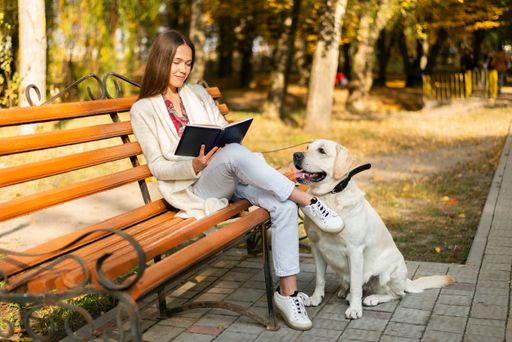Just like humans, dogs can suffer from bouts of anxiety. The severity and frequency vary in different breeds. Signs of anxiety include yawning, excessive licking or chewing, aggression, pacing, barking and restlessness. So what do you do if you notice your dog is displaying any of these symptoms? Fortunately, there are many options! Here are some ways to help your dog feel less anxious and stressed.
Remove Triggers
If you notice that something specific gives your dog anxiety, remove that stressor if possible. Many dogs get stressed from hearing loud sounds or from being around strangers. If either of these issues makes your dog anxious, avoid them as much as possible. Sometimes it's not feasible to protect your dog from triggers. For example, a neighbor could set off fireworks, or you get a visitor your pup doesn't know. Instead, you may have to find a way to treat this anxiety, especially if it is a worsening issue.
Use CBD Oil
People have been using CBD oil to treat pain, anxiety, depression and a slew of other health issues for quite some time. It turns out that it has the same effects on dogs. CBD for dogs can alleviate anxiety by regulating serotonin levels. In fact, CBD oil works much like an antidepressant. Giving your dog a CBD oil-infused treat is a natural way to help with this tension.
Exercise Your Dog
Take your dog for a walk or play with it regularly to reduce its anxiety. Since a prevalent cause of anxiety occurs when a dog is separated from its owner, spending time with your pooch before you have to leave can make a significant difference in its stress level. Exercising will not only wear your dog out so it will nap while you're gone, but a good workout will also release endorphins, the feel-good hormones. Think about how you feel after a hard workout — energized and happy. Your dog will feel the same way, which will make your departure much easier to handle.
Turn on Music or the TV
Another way to help your pooch with separation anxiety is by playing media. If you decide to play music, find a station or make a playlist that has reggae, soft rock or classical music and keep the volume low. If the media is too loud, it's liable to increase your dog's nervousness.
Alternatively, leave the TV on for your pup. Believe it or not, there are stations specifically made for dogs, which are meant to stimulate your pup's senses. Dogs seem to enjoy watching animals, especially other dogs, on TV. However, each dog has its own likes and dislikes, so it's possible your pooch won't be interested in the media at all. Make sure you test out playing music or watching TV with your pup before leaving it alone with either one.
Give Your Dog a Time-Out
Putting your dog in a time-out crate isn't a punishment. Regardless of whether your dog is acting up or exhibiting another anxious behavior, showing your dog to its crate in a quiet room will give it time to calm down. Make the space as comforting as possible. Turn the lights off or use a lamp to dimly light the room, play soft music and use aromatherapy. As for your puppy's crate, add items that make your dog feel at ease, such as a blanket or favorite toy.
Go to the Vet
If you're unable to find ways to help your dog with its anxiety or its anxiety seems to be getting worse, make a call to your vet. Your dog could be feeling nervous from an underlying medical condition, which your vet can treat. The vet may give your dog a physical exam and run a blood panel to rule out any medical problems. If these tests don't show anything out of the ordinary, the best course of action might be medication. Additionally, your vet may refer you to a veterinary behaviorist. This type of doctor specializes in treating anxiety and fear in pets.
The Bottom Line
If your dog suffers from anxious tendencies, don't fret. Many things can alleviate your pup's worrisome feelings.



















